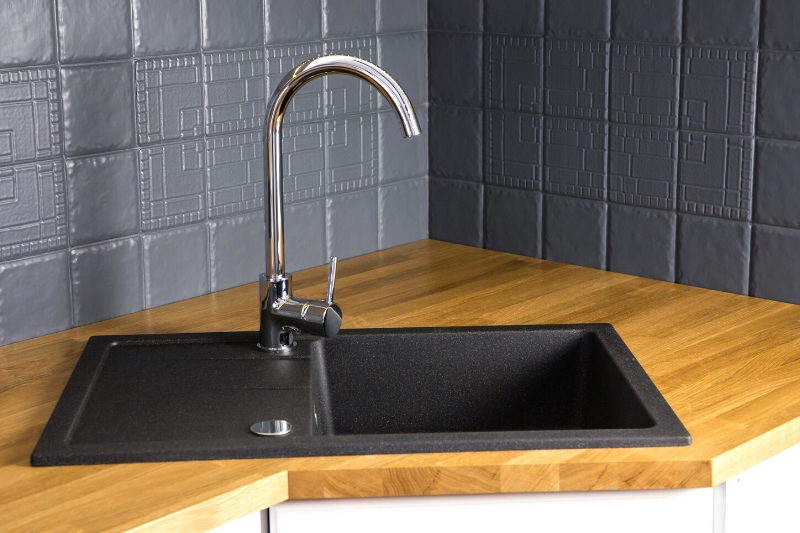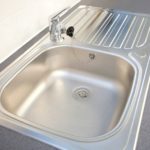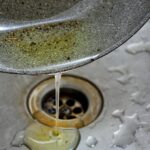Granite sinks are a popular choice due to their durability and aesthetic appeal. They easily do the same job as a typical stainless steel sink while giving your kitchen a more luxurious feel at a reasonable price.
Unfortunately, granite sinks will become dirty and stained over time, making them appear dull and unattractive.
Although granite is incredibly durable, it can easily become damaged if the incorrect cleaning products and techniques are used.
If you’re unsure how to safely clean and maintain your granite sink, you’re not alone.
In this article, you will learn how to clean a granite sink with natural ingredients.
So whether you’re looking to give your sink a quick once-over or a deep clean, we have all the information you need to restore your sink to its original state.
Deciding What to Clean Your Granite Sink With
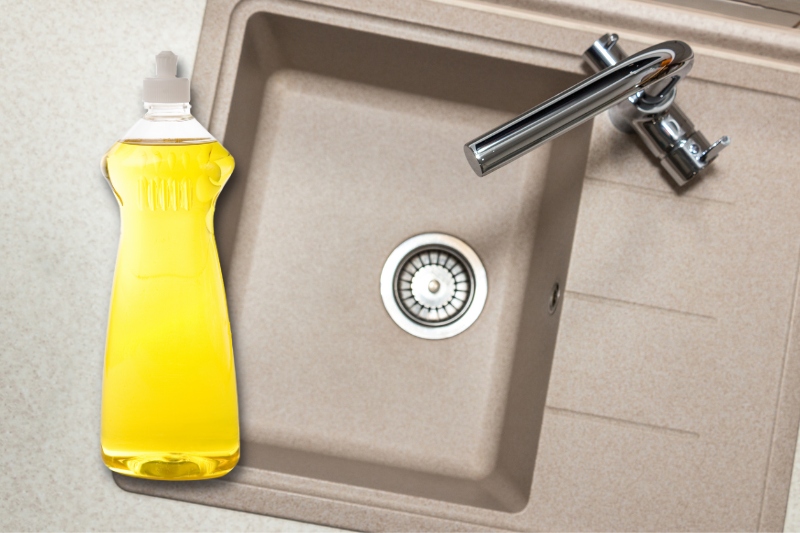
If you’ve just had a new granite sink fitted, the last thing you want to do is damage the surface using the wrong cleaning products.
Although some harsh chemicals will cause damage to the surface, there are plenty of commercial cleaners and natural ingredients that can safely be used.
The best cleaner for a granite sink will vary slightly based on two factors:
- Whether your sink is made of natural or composite granite.
- Whether you’re looking to do a general clean or remove tough stains and build-up.
Keeping this in mind, our recommended cleaning products and methods are covered in greater detail in the sections below.
Maintenance Cleans for Your Granite Sink
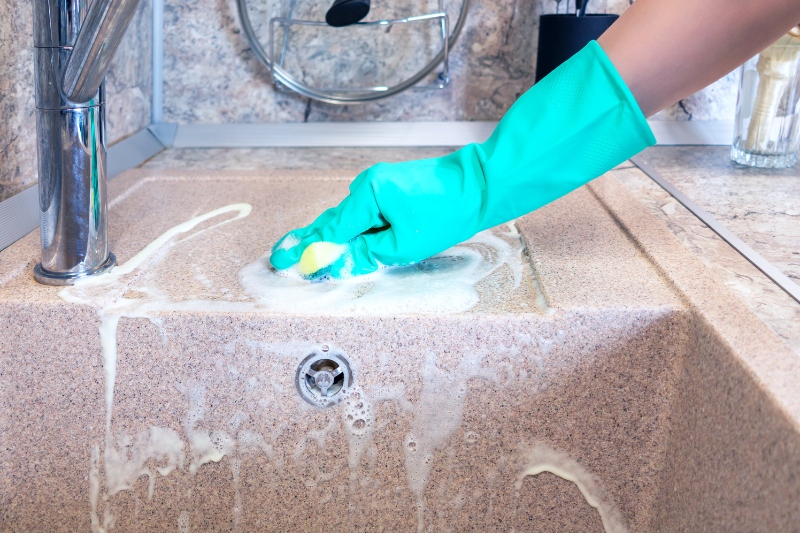
If you’re looking to give your sink a quick wipe-over to remove accumulated dirt, the only cleaner you will need is a mild soap, such as washing-up liquid.
Washing-up liquid can be used safely on both natural and composite granite, effectively cleaning all types of granite sinks.
Once you have your washing-up liquid to hand, follow the below steps for a quick maintenance clean:
- Fill a small bowl with warm water. Add a little soap and swirl until suds form.
- Dip a soft cloth in the soapy water, then use this cloth to wipe down the sink.
- Rinse the granite sink with clean water and leave it to dry.
If you’d like a slightly tougher cleaning product when giving your sink a quick wipe, there are plenty of commercial cleaners out there that are designed for use on granite.
However, these will typically contain harsh chemicals, so we suggest sticking with soap if you’re looking for a milder, less abrasive cleaning product.
Moreover, while washing-up liquid will help refresh and maintain your sink between deep cleans, it won’t effectively remove any limescale or tough stains from the surface.
This brings us nicely to our next section…
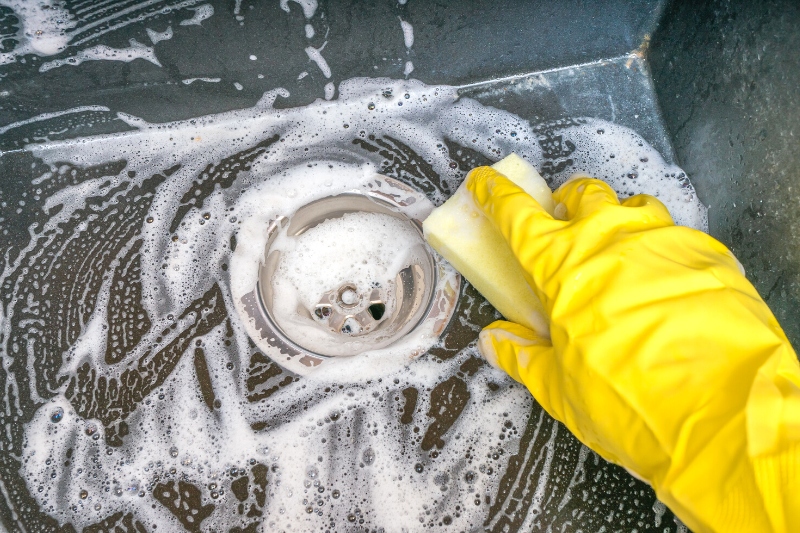
Removing Hard Water Stains From Natural Granite
Hard water stains (also known as limescale) are dried mineral deposits that are left behind once any water evaporates from your sink. If left to sit for a long time, these deposits can ruin the appearance of your granite sink and become incredibly tough to remove.
Fortunately, you can remove limescale build-up with an ingredient you’ll likely have in your kitchen already: bicarbonate of soda. This product is again safe and effective on natural and composite granite surfaces. However, the best method for use on composite granite sinks is detailed below.
Assuming you have a natural granite sink, follow the below instructions for the best results:
- Combine a little bicarbonate of soda and water in a bowl to create a cleaning paste.
- Apply a layer of paste to the limescale and leave to sit for a few minutes.
- Gently scrub the paste into the sink using a sponge.
- Rinse with clean water and dry with a microfibre cloth.
- Repeat steps 2 to 4 as necessary until all the hard water stains are gone.
If you really want your granite sink to shine, you can apply a thin layer of mineral oil to the granite once you’re happy it is clean.
To do this, simply wipe a thin layer of oil all over your sink, leave it for a minute to absorb, and then wipe away any excess.
Removing Stubborn Stains From Natural Granite
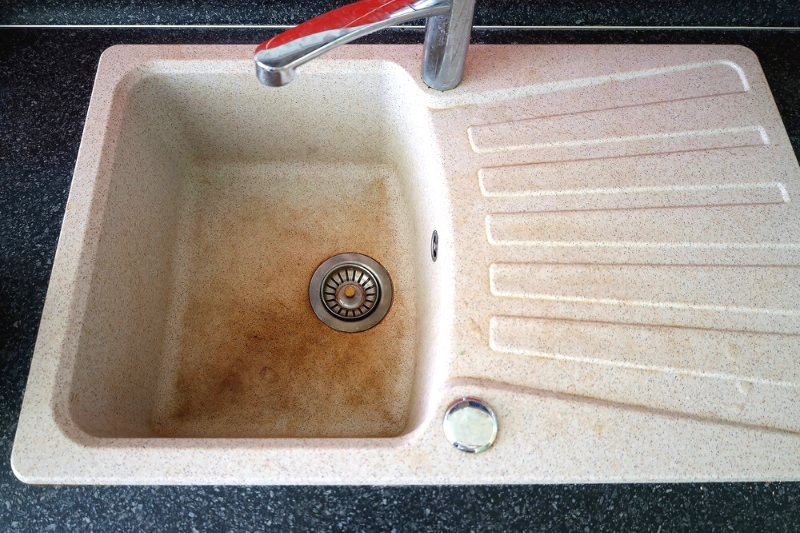
Granite is a naturally porous stone. This means it is very easy for liquid to seep into your sink if it hasn’t been properly sealed.
Unfortunately, this can make it difficult to remove certain stains. This being said, any patches of discolouration can be fixed if you have the proper cleaning technique.
The below steps will help you remove even the most stubborn stains from your sink.
We recommend only using this method on natural granite sinks (you can find an alternative method for deep cleaning granite composite sinks in the next section):
- Mix bicarbonate of soda and hydrogen peroxide in a bowl until a thick paste has formed.
- Apply a thick layer of paste (roughly ½ inch thick) to the stains.
- Cover the area with cling film and secure the plastic in place with a bit of tape.
- Leave the paste until dry—this can take anywhere from 24 to 48 hours.
- Remove the cling film and use a soft cloth to wipe away the dried paste.
- Rinse the area with water and dry with a microfibre cloth.
- Repeat as needed until the stain has completely disappeared.
Once again, you can add a layer of mineral oil to the granite at the end of the cleaning process to restore shine to your sink. This is an optional step and may not be needed after every deep clean.
Cleaning a Granite Composite Sink
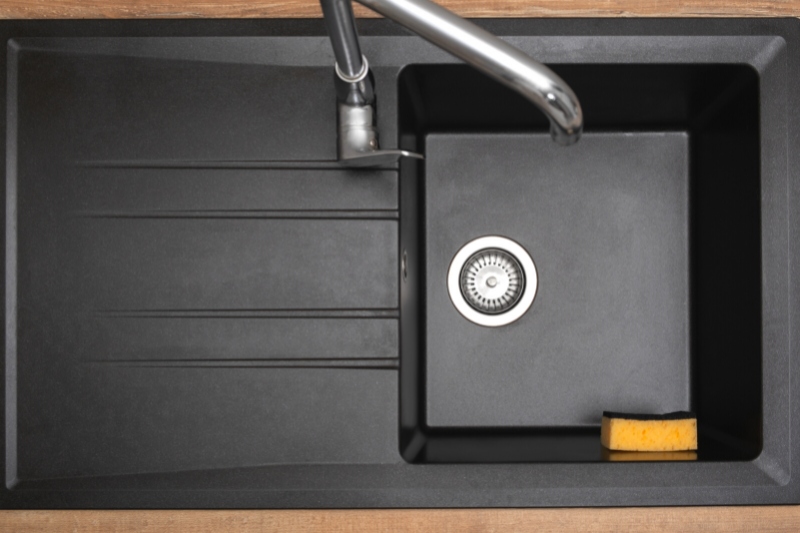
Granite composite is a highly popular material for sinks and countertops. It is made to mimic natural granite but is much cheaper as it is made of 95% granite dust and 5% resin.
This gives a beautiful finish that is harder than the natural stone while also being non-porous and stain-resistant.
Although these composite sinks are primarily made of granite, they require a slightly different cleaning technique. You’ll get the best results by following the below steps:
- Give your sink a general maintenance clean using washing-up liquid as directed above.
- After cleaning, thoroughly dry the sink with a microfibre cloth.
- Sprinkle a layer of bicarbonate of soda over the granite surface.
- Spray a little white vinegar over the top and leave for a minute or two.
- Use a sponge to scrub the mixture into the sink, paying attention to any stained areas.
- Rinse away all the residue with warm water and dry with a microfibre cloth.
Although composite granite sinks are not made from 100% natural stone, they can still benefit from a coating of mineral oil.
You can still apply this as you would with a natural granite sink, ensuring you leave the oil to absorb for a minute before wiping away the excess.
Can You Use Bleach on a Granite Sink?
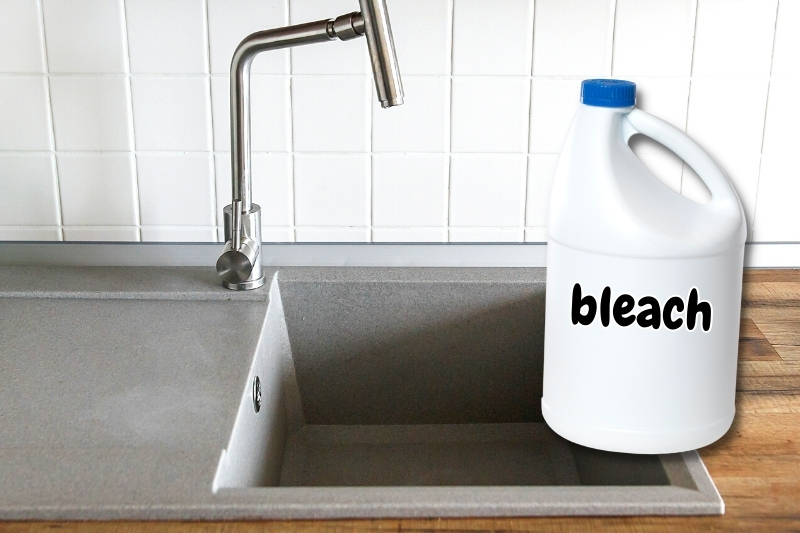
Natural granite is a very porous stone, meaning it is highly susceptible to damage from abrasive and acidic substances. This means you must take great care when choosing cleaning products.
One very popular cleaning product is bleach. It is a great disinfectant and is often used in commercial cleaners and on its own.
Unfortunately, the harshness of this cleaner will typically work against you when cleaning granite, leaving behind noticeable discolouration and etchings.
This being said, the amount of damage done will vary based on the type of granite used and whether or not it is coated in a polished finish.
These protective coatings will make the granite more resistant to liquids and limit the amount of discolouration and the number of scratches that occur.
If you’re at all unsure about using bleach on your granite sink, it is best to avoid it completely. This includes both diluted bleach and any products that contain low levels of the disinfectant.
Even though granite composite isn’t as porous as natural granite, we also recommend you avoid using bleach on this surface as it could still cause stains.

Hannah has a passion for cleaning. She worked her way around Australia by cleaning hostels in exchange for free accommodation and used her cleaning skills to bag a job as a chalet host for a luxury ski company in France.
